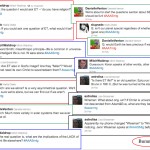Our first assignment for our Social Media class was to sign up for a Twitter account and to follow people relevant to our early careers as science writers. Although I already had a Twitter account, I hadn’t used it much beyond a couple complaints and self-promoting links, largely because my complaining and self-promoting needs were taken care of by my Facebook and Google chat statuses.
However now that I’m Twittering while wearing my science reporter’s hat, I’ve found it much more useful. I like to check in just to see what’s making the rounds in the science journalism world. The most important change is that I’m now following clued-in writers, and I’m picking up on all kinds of interesting science and journalism tidbits.
But my sunny re-visit to the Twitter kingdom was twisted by a little shame spiral earlier this week when I realized I may have broken a rule of Twitterdom—not giving credit to the Tweeter who turned me on to an interesting story.
On the morning that the Chemistry Nobels were announced, I noticed an interesting tweet claiming that one of the awarded professors had quit science, possibly due to funding problems. Fascinating, right? How terrible, how juicy that a researcher who would eventually be awarded one of the pinnacles of scientific achievement could have ever been unable to find funding!
The tweeted link I read led to a blog posting that highlighted a couple points from a letter published in a chemical journal, which I tracked down. Wanting to share, and preferring to share from the most original source of the information, I tweeted the link to the original letter, with no mention of the tweet that enabled me to find it.
Later that day, a nagging voice in the back of my head just wouldn’t shut up. Had I broken a twitter rule by not attributing my tweet to the original tweeter? We didn’t share the same link, but I certainly wouldn’t have come across that news if it hadn’t been for their savvy tweet. I’m sure part of my faux pas stemmed from my own dislike of symbol-crowded tweets. It only takes 2 units of @ or # for my eyes to completely glaze over a message. Readability is important, right? Perhaps not so much as giving credit where credit is due.
A little googling of Twitter etiquette leads me to believe I should have attributed with a “via @” at least. But it got me to thinking– how far does the bluebird fly before a twitter attribution is no longer necessary? If my friend tweets about the White House getting new solar panels and that sends me surfing to a site with a nifty timeline of alternative energy use at the White House, do I need to @friend in my tweet about the timeline?
Of course, as journalism noobs, we have a lot to learn about attribution in the broader reporting contest. I still don’t have confidence in which facts get cited and which don’t. I was surprised to learn that lifting entire sentences from press releases (with no citation of the original author) is considered kosher, albeit perhaps lazy. Similarly, when researching some highly-awarded scientists for my internship, I noticed how commonly news writers would use word-for-word copies of awards statement in their reports.
Part of my confusion over this issue is that attribution and sourcing in the social media world (and reporting world) differs so much from the science world. In a scientific paper, every nugget of knowledge that didn’t come from your team’s own bench beating must be (or should be) cited, and preferably cited to the very first mention of said nugget. This is probably part of my desire to link to the most primary source of the information in the aforementioned tweet, even if it wasn’t MY initial source.
To me, the re-tweet attribution reminds me a lot of talking with a science colleague who points you to a relevant study that you hadn’t yet included in your scholarly review. That friend isn’t credited in the final paper (unless of course they made so many suggestions that they end up in the acknowledgments section). But, Twitter isn’t science, it’s Social Media, and the rules are different. My own re-entry to Twitterdom is a great example of how important it is to find helpful users to follow. By properly attributing the source of a fun fact, you help make connections between the source and other users.
I hope we continue to learn the ins and outs of attribution, citing, and sourcing over the next year as SciCommers. And I love to hear your thoughts about when attributing sources is necessary, in both the social media and reporting worlds.







D’oh!
Is there a twittiquette manual somewhere?
I’ve encountered twicky attribution issues when writing ‘scholarly articles’ (chuckles) but I never imagined it would be such an issue in our work here.
But it totally is. And that’s a salient question you raise about bluebird migration. I mean, if everyone attributed every twitter-tweet to the source from whence it came, we would quickly exceed our 140 character maximum. It could get a little ridic.
I vote for common sense.
There are lots of twittiquette guides on the interwebs, of varying quality levels as you might expect. I liked this one: http://tiny.cc/zuwlz . It links to a posting about journalists using social media and also has some good comments from the twitterverse about other etiquette points.
(The SuperNews clip is great for a laugh if you haven’t seen it already!)
I, neo-twit, think you’re ok. You’re several steps removed from the bluebird’s nest.
But just in case, you could do what Lavrusik said is ‘uncommon’ and go with the ‘hat tip’ — just to be different — and also because that’s kind of how it went down.
And, you also have to credit yourself for being interested and digging up original source info, right?